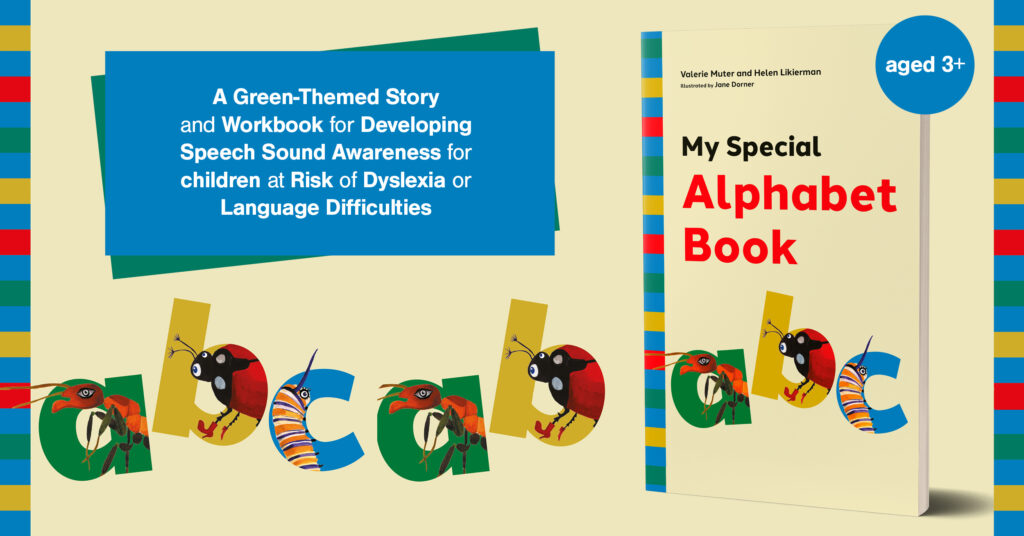Child psychologists, Helen Muter & Helen Likierman introduce their new book which helps children who might find reading and language skills more difficult than their peers through a vibrant, green-themed story and workbook.
Illustrated alphabet books have featured on school bookshelves and in family homes for many decades – and there are hundreds of them out there! Parents and early years teachers have found these books invaluable in teaching children letter sounds so they can make a start in learning to read. So why another? And why a special alphabet book? We – Valerie and Helen – are child psychologists who have a special interest in helping children learn to read. Through our research, our clinical assessments and our teaching experience, we know that learning the letter sounds is only one of the skills children need to get off to a good start in reading; the child’s awareness of how words are made up of sound sequences and having good oral language skills are important too. We have also come to understand the difficulties that some children have in learning to read well – and know how easy it is for these difficulties to continue to impact on progress at school later. We therefore decided to create a new and indeed unique type of alphabet book – My Special Alphabet Book – which covers all the foundation skills that children need at the beginning stages of learning to read.
My Special Alphabet Book is designed to help children who might find reading especially hard. These children can be described as having a literacy difficulty which is often called dyslexia. We know that, if a parent has had trouble learning to read and spell, it is likely that their children will have difficulties too. Also, children who are slow in their speech and language development may struggle to read. If a parent has had reading difficulties and/or a child still has language difficulties on starting school then the child is at risk of dyslexia.
There is a huge research base that has shown that here are three main foundation skills essential to making a good start in learning to read:
- Having good spoken language skills, especially a broad vocabulary.
- Phonological awareness which is children’s realisation that spoken words are made up of sequences of sounds.
- Being able to learn the sounds that each written letter of the alphabet makes, without difficulty (letter knowledge).
We want to share with parents, early years teachers and special needs professionals how to ensure these foundations are in place as children begin to learn to read. My Special Alphabet Book begins with an illustrated alphabet story and then introduces workbook-based activities that help children to:
- Learn the alphabet letters
- Learn the sounds of the letters and how to say them
- Become aware of sounds in spoken words (phonological awareness)
- Link letters sounds with printed letters
- Develop spoken language, including learning to listen, building up vocabulary, use of grammar and narrative (through telling stories and describing events)
All these skills need to be in place before children start formal reading at school. However, the child with language difficulties, or who has dyslexia, will find it hard to develop these critical skills.
The alphabet story, with Jane Dorner’s colourful and engaging illustrations, is designed to involve children with an environmental topic very important to our times, that of making our planet greener by managing our waste better. In the workbook section, there are some eco-activities to promote deeper understanding of the topic and to teach children how to better manage waste and learn to recycle to save the planet.
This is a book with activity games designed for children and grown-ups to enjoy together. First, there is the Special Alphabet story – The Alphabet Recycle. Second, there is a guide for adults explaining how to use this book; in this section, we cover which children are likely to find reading difficult (this includes describing dyslexia and language difficulties); what skills children need to have to learn to read; how to read the Alphabet Recycle story with a child; and guidelines for using the foundation skill activities and extension skill activities. Third, there are the foundation skill activities themselves: these include speech sound games, the sound-and-letter linkage games, the listening games and the language games. Next, there are the extension activities which include more advanced speech sound and sound-linkage games, more advanced listening and language games and drawing and letter writing activities. Finally, we conclude with eco activities to help the child learn about how they can help save our planet by being waste aware and being active recyclers.
Politicians and educators have expressed concern in the media that many children are starting school with limited speech and oral language skills which form the foundation for learning to read. This book has additional wider relevance in these current challenging times when so many children have missed out on critical stages in their education, and are falling behind. Once behind, it is almost impossible to catch up. The best start is to get the foundation skills learned early.
